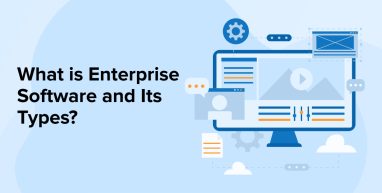
It is always a challenge for enterprises to handle their operations manually, especially with breakthrough changes occurring in the market. The advancements in software development provide a valuable opportunity for businesses to function seamlessly and hassle-free. The business is constantly evolving and growing enormously and so is the need for software development within the enterprise. Well, this blog is a disclosure on what enterprise software is and the types of enterprise software that can be beneficial for any business to boost sales and maximize profitability.
Enterprises at every level are increasingly focused on developing software that will streamline and augment their operations. It started as a buzzword but now has settled among businesses regarding how enterprise software can benefit their enterprise in the long term and what are some major examples of enterprise software.
To start, we will take a brief overview of enterprise software.
The definition of enterprise software isn’t tricky. Enterprise software is designed to meet unique business needs unlike addressing individual customer demands. It provides organizations tailored solutions that are highly efficient and productive across various departments. Let’s understand it in depth.
1. What is Enterprise Software?
Enterprise software is referred as a computer program that is designed to assist large enterprises or business in a wide range of duties, such as data processing, marketing, business development management, and client service. Solutions like these are often designed to work with a large number of users and scale.
Every enterprise has unique business needs. Companies develop software solutions to address these needs. This software solution that manages the needs and functions of an enterprise is called an enterprise software solution or an Enterprise software application.
Usually, when we hear the word “enterprise” in a conversation, it doesn’t always refer to to large-scale enterprises. It encompasses organizations with unique business needs and that can be any size of enterprise from large, mid-size, and small businesses. The only distinguishing factor is that these businesses should cater to their specific requirements through a single,-multifunctional application.
Now, if this question arises in your mind, what benefits does enterprise software offer that a normal software solution cannot? Then, the answer to this is enterprise software is a one-stop solution to multiple business challenges that optimize business operations and enhance the bottom line of business systems.
1.1 Why is Enterprise Software Important?
Many companies rely on enterprise software for both routine and important business processes. Here are a few of the main reasons why enterprise software is important for companies to have:
1. Greater Effectiveness Inside the Organization
Automating repetitive, manual processes that might otherwise take staff several hours is possible with the help of enterprise management software. Over time, this frees up enough time for other teams to focus on higher-value activities, leading to improved operational efficiency and better business outcomes with less effort and money spent.
2. Strengthen Teamwork
The quality team cooperation and the ability to work together more effectively are both enhanced by enterprise software that improve communication and the flow of information between workers.
3. Enhanced Data Utilization
Additionally, application software facilitates the rapid and easy collection, analysis, and presentation of enterprise data. Therefore, when it comes to taking action for the company, information derived from accurate data is essential.
4. Scale Resources
Businesses can expand their operations and allocate resources more efficiently with the help of business software. under doing so, they are able to keep expenses, resources, and budgets under check, and scale up or down as needed.
5. Boost Consumer Satisfaction
Thanks to enterprise software solutions like CRM, marketing automation, and contact center software, businesses can now learn every little thing about their customers and their demands. Businesses can more effectively satisfy customer requests for individualized service by gathering and analyzing client data.
2. What are the Examples of Enterprise Software Application?
Enterprise software needs can be unique as per the specific requirements of the market and the business. Say, for example, a pharma enterprise may need a system that efficiently manages customer relationships. On the other hand, a software development company might need a proper enterprise planner that efficiently manages resources, payroll, and other necessary employer details. So these are some of the essentials every enterprise needs to survive in the market.
Now, we will discuss the top Enterprise software solutions that play a key role for businesses that can establish transparent communication and boost productivity. These essential tools are indispensable for almost all types of businesses.
2.1 Enterprise Resource Planning (ERP)
Enterprise Resource Planning (ERP) is a process of systematically gathering all information in a system and digitizing it into different modules. It creates a simpler network between multiple departments, allowing everyone in the company to operate from a centralized database and receive real-time updates.
Capability of ERP Software
An ERP (enterprise resource planning) framework is a bundle of various business software bundled together. This software, also known as modules, may be obtained individually or as part of an ERP framework. These programs are often designed around the customer relationship module, which can include supply chain and procurement, warehouse management, and HR/labor management, depending on the industry vertical.
ERP system is not limited to just one industry or company size of the domain, every enterprise has the willingness to manage multiple processes efficiently.
2.2 Customer Relationships Management(CRM)
CRM Software
Customer Relationship Management (CRM) is a synonym for satisfactory customer experience. Yes, Customer relationship management is software that sophisticatedly manages customer data with every possible detail that would upsell sales, cross-sell, and promote enterprise at all levels.CRM functions like a brain for businesses, helping them meticulously manage all their data and deliver exceptional business results.
Capability of CRM Software
CRM programs are more focused on marketing, including lead generation, nurturing, sales pipeline growth, and implementation, as well as customer support. You must enter all the information about your contacts and records carefully. This includes personal details, shopping history, refunds, grievances, and customer service interactions.
All types of businesses, specifically retail, eCommerce, and manufacturing industries, can efficiently use this type of enterprise software application. Any customized CRM is capable of managing social media activities, sales lead management, showing exact project progress status, and many more important aspects that make enterprise software sustainable.
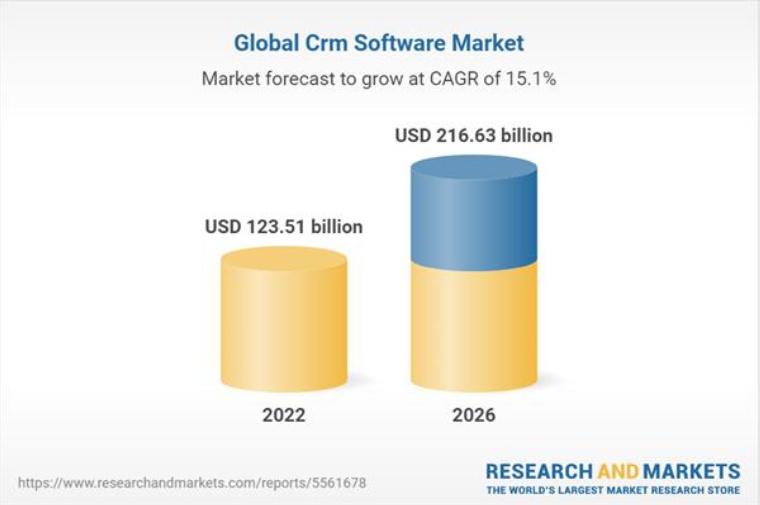
The global CRM software market is expected to grow from $106.23 billion in 2021 to $123.51 billion in 2022 at a compound annual growth rate (CAGR) of 16.3%. The growth is mainly due to the companies rearranging their operations and recovering from the COVID-19 impact, which had earlier led to restrictive containment measures involving social distancing, remote working, and the closure of commercial activities that resulted in operational challenges. The market is expected to reach $216.63 billion in 2026 at a CAGR of 15.1%.
2.3 Business Intelligence (BI)
BI Software
It’s time to inject intelligence into your monotonous business. By incorporating business intelligence tools into your business organization, you can take benefit of enterprise software services that gather data and convert it into information for actionable business decisions. Using BI is a strategic way of gaining a competitive edge by using the right set of data, with logical reasons and analytical findings.
Capability of BI Software
The word “business intelligence” is often used to describe a collection of resources that provide fast, easy-to-understand access to data-driven insights regarding an organization’s current state. Business intelligence tools are a type of enterprise software solution that not only offers an analysis of data but also creates a dashboard showing a graphical representation of summaries through charts, graphs, bars, and other pictorial representations. These reports can also be downloaded, and business leaders can analyze them in real time and take necessary steps at the right time.
2.4 Human Resource Management (HRM)
HRM Software
Human Resource Management is a tedious and time-consuming task. Businesses have to invest time in mundane tasks to get desired results. With the advent of automation, HRM tools were introduced. To bring hundreds of the right resources on board, it is important for companies to automate various tasks and make employees free to sieve out the best talent. Every enterprise wants to hire professional and knowledgeable staff in order to make their company the best it can be. Human resources are the foundation of all these challenges.
Capability of HRM Software
Another high-performing and competent enterprise software is the Human resource management system. HRMS tools manage everything from employee recruitment, selection, induction, and orientation. They also manage employee advancement, success appraisal, and benefits. Their labor unions and ensuring employee protection, security, and fitness measures are all part of human resource management.
2.5 Supply Chain Management System (SCM)
SCM Software
Supply chain software manages the flow of supply chain networks. This includes raw materials as well as packed items. Supply chain management is a systematic process of managing the workflow from scratch of products to final delivery. SCM tools allow businesses to monitor marketing and sales KPIs, streamline processes, and boost profits. For businesses like retail and eCommerce, Supply chain management and logistics are boons that can help them craft strategic benefits in the long run.
Capability of SCM Software
From the sourcing of raw materials, equipment, and supplies to the delivery of finished goods to end-users, supply chain management (SCM) is concerned with preparing & managing the movement of products.
SCM system manages market forecasting, manufacturing, inventory control, supply quest, logistics, commodity transportation, and a variety of other processes.
2.6 Payroll Management
Managing payroll is a crucial part of running a company. But if you don’t have the right tools, it can be a tedious and difficult process. Thankfully, enterprise-level payroll management software automates a plethora of HR-related chores, including salary and benefit calculations as well as tax calculations.
Companies can also monitor workers’ working hours, overtime, and holidays with the use of this business software’s time and attendance features. They make it easy and error-free to generate reports for things like payroll, taxes, and other HR paperwork. Business performance and decision-making can be enhanced with the use of such useful solutions.
3. Examples of Other Enterprise Softwares
Apart from the aforementioned enterprise software systems, such as CRM software or ERP systems, here are some other examples of enterprise application software that consolidate all the activities needed to manage content under one roof.
3.1 Enterprise Content Management Software
An enterprise content management software (ECM) can be defined as a platform that allows an entire organization to store, organize, and retrieve the organization’s content smartly. The content could be both structured and unstructured. ECM also secures content digitally in compliance with organizational policies. ECM systems make these records retrievable and shareable, allowing the content to transfer with minimal risk to the content’s security.
Such enterprise systems ensure that users can easily access up-to-date documents. Unlike other enterprise software, ECM includes version control features so that old versions of documents can be recovered as needed. Some of the best features and capabilities of such project management tools include:
- Capture, Imaging
- File Sync, Storage, Archiving
- Providing actionable insights
- Document Management
- Records Management
- Collaboration
- Content Publishing and Creation
- Security, risk management, and information governance
- Integrations
3.2 Business Process Automation
The next name among popular enterprise software systems is business process automation. This enterprise system is a tech-based procedure for automating activities that keep running within your organization. Such technology-driven approach tend to simplify, reduce running costs, increase efficiency, and improve service delivery just to name a few benefits.
- Client Management – Businesses, irrespective of their size, often find it extremely hard to manage both accounts and clients. With an enterprise system, things can be done at the right time.
- Marketing and customer support – Businesses can create ecosystems that simplify and restructure operations. They can merge different web applications to work conjointly.
- Optimized website management – This ensures that new and existing customers have the best user experience when interacting with your website. Various tools are available that you can use to spot and fix website issues automatically to avoid long downtimes.
3.3 Marketing Automation
Marketing campaigns need careful attention, especially when consumers are being bombarded with marketing messages from every direction. Making a marketing campaign stand out has become more difficult than ever before. More or less, they face immense pressure to come up with more innovative ideas that are bigger and better than anything their competitors are doing. But doing this, on top of the day-to-day marketing activities, is not easy.
Fortunately, we have enterprise applications like marketing automation tools that help businesses to identify potential customers and automate the process of nurturing those leads to sales readiness.
4. Why Should Every Business Adopt Enterprise Software Development?
The entire blog was a clear demonstration of how enterprise software is imperative for your business and its benefits. Every business, knowingly or unknowingly, uses this software within the business in some smaller form. Building enterprise software shapes the foundation of businesses, allowing them to easily manage their regular operations with custom features and functions. The business analytics aspect of enterprise software offers clients consistent feedback and regular updates on developed applications. These are not just applications but information systems that display the best use of technology for your business.


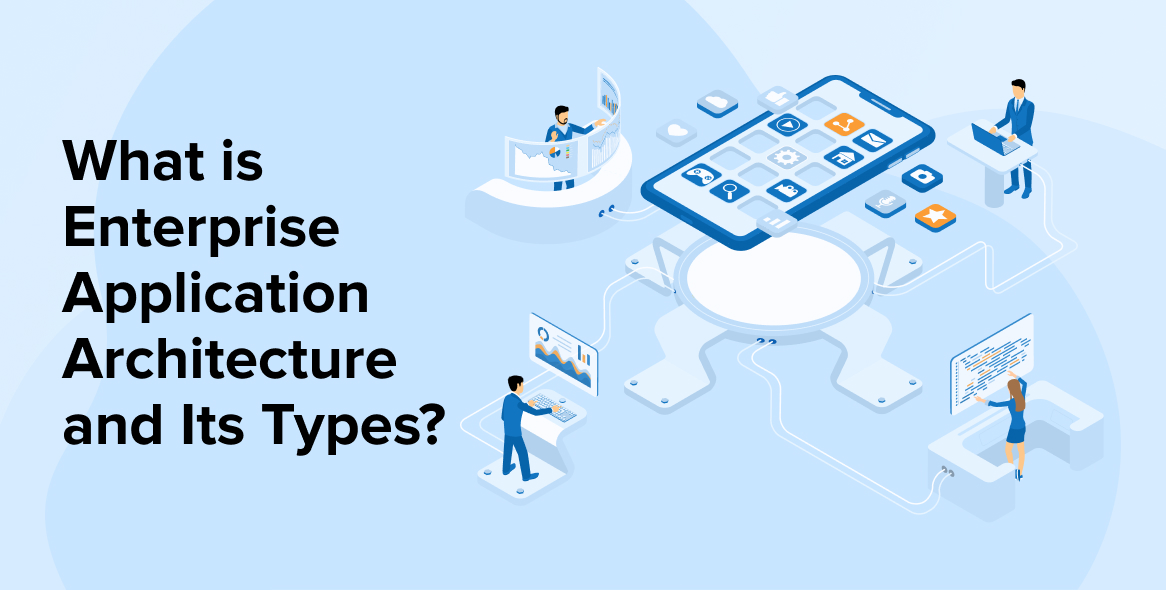
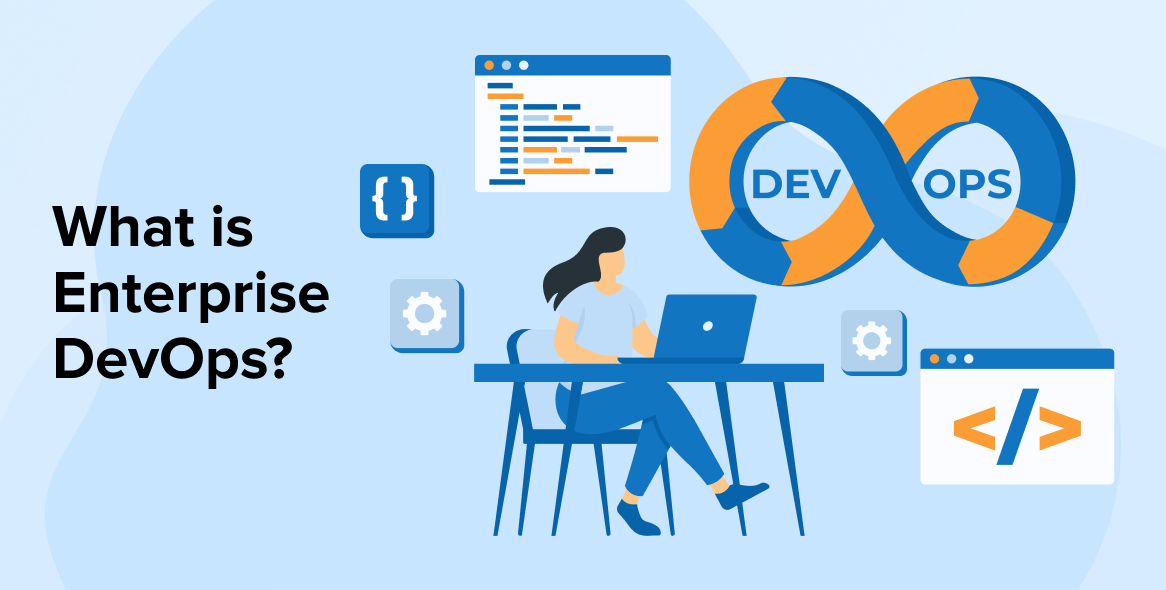
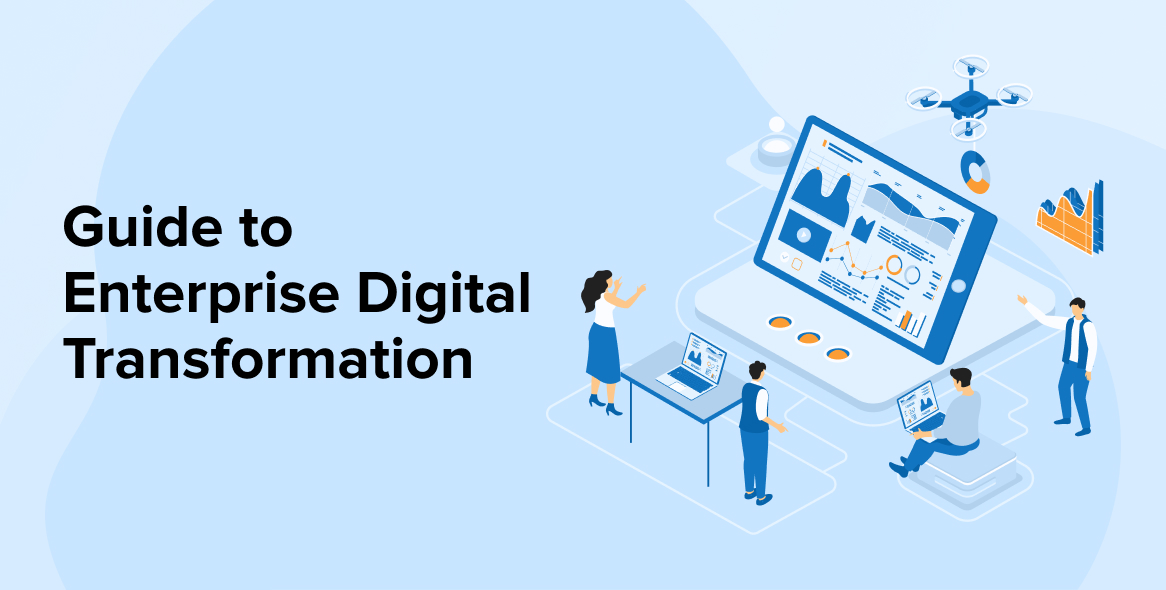

This is a fantastic breakdown of enterprise software, Itesh! Especially valuable is the inclusion of the different types of software and how they can benefit businesses. Very informative for companies of all sizes. Thanks for sharing!